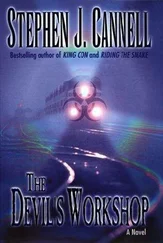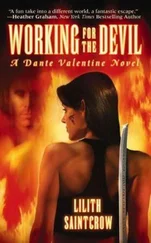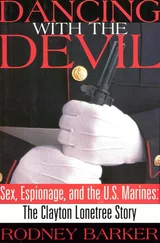Алан Джадд - The Devil's Own Work
Здесь есть возможность читать онлайн «Алан Джадд - The Devil's Own Work» весь текст электронной книги совершенно бесплатно (целиком полную версию без сокращений). В некоторых случаях можно слушать аудио, скачать через торрент в формате fb2 и присутствует краткое содержание. Жанр: sf_mystic, на английском языке. Описание произведения, (предисловие) а так же отзывы посетителей доступны на портале библиотеки ЛибКат.
- Название:The Devil's Own Work
- Автор:
- Жанр:
- Год:неизвестен
- ISBN:нет данных
- Рейтинг книги:3 / 5. Голосов: 1
-
Избранное:Добавить в избранное
- Отзывы:
-
Ваша оценка:
- 60
- 1
- 2
- 3
- 4
- 5
The Devil's Own Work: краткое содержание, описание и аннотация
Предлагаем к чтению аннотацию, описание, краткое содержание или предисловие (зависит от того, что написал сам автор книги «The Devil's Own Work»). Если вы не нашли необходимую информацию о книге — напишите в комментариях, мы постараемся отыскать её.
The Devil's Own Work — читать онлайн бесплатно полную книгу (весь текст) целиком
Ниже представлен текст книги, разбитый по страницам. Система сохранения места последней прочитанной страницы, позволяет с удобством читать онлайн бесплатно книгу «The Devil's Own Work», без необходимости каждый раз заново искать на чём Вы остановились. Поставьте закладку, и сможете в любой момент перейти на страницу, на которой закончили чтение.
Интервал:
Закладка:
So far from dampening my spirits, the raw wet Yorkshire afternoon gave me something to relish. If you forsake somewhere with the colour and vividness of Antibes you may as well go for its opposite, and this no-nonsense, not unfriendly northern town was quite close to that. I found even the damp dwindling light satisfying. There are many lights and half-lights in such a climate and I had already begun to feel that I was inhabiting a world of ghosts. It suited me.
What is left of the castle occupies the highest point of the town, with the river and railway far below. When I went there the mist was breeding a fine rain and dusk was closing in. There was only one other person, an old man who walked slowly round the perimeter. Few who live in a place bother with its ruins on a wet afternoon and those that do may be harmless but are often better avoided. If we allow the lonely and the lost to detain us for long we sink with them, before our proper time. That, at least, was how I felt then.
We had actually passed before we recognized each other. It took a few steps for each to place the faded lines of the other drifting wreck. Edward was corpulent, had heavy unshaven jowls and dragged one foot because his shoe had no lace. He wore an old tweed hat and a dirty duffel coat. His cheeks were very red and his blue. eyes bloodshot. I had on my best suit for the interview and must have looked respectable but I was a greyer, older man than he might have thought, with bags under my eyes and teeth not my own.
We stood and stared with no greeting. There was nothing to be said. It was not embarrassing but it was sad in a quite impersonal way, as if it were life itself that was fading.
'Do you live here?' he asked at last. They were the same precise tones but hoarse now. I explained what I was doing. 'I live here,' he said. 'Come and have a drink.'
I had forgotten that he came from Yorkshire. 'Near Harrogate' was all that he had ever said and I hadn't known that that meant Knaresborough. We went down through the town towards the river. He walked slowly, which gratified me. In the lights of the shops he looked even more like a tramp; no one would have believed he was a multi-millionaire. I had to keep insisting to myself that what had happened between him and Chantal really had happened, because when I looked at him or when he was talking — which, uncharacteristically, he did all the way, proffering a detailed, coherent, unrequested history of the town — the whole business seemed an irrelevance, nothing to do with either of us.
He led us down a steep hill to where the River Nidd cuts through a wooded gorge on the edge of the town. We did not cross the old bridge but turned left into the narrow road that runs by the river. It was by then dark and the road was unlit. We passed a few cottages and one or two larger houses. That lane is now a fashionable and expensive part of town and the houses have carports or garages but then it was dark, uneven and solitary, and quite soon the only sounds were of the river. After the houses the lane ran through tall trees and was bounded on the right by a stone wall. To the left the rockface rose steeply. Edward continued his local history in a voice that seemed indecently loud in such solitude. It was raining steadily by then and during his pauses I could hear the pitter-patter upon thousands of leaves.
He turned abruptly to the right, leaving me to follow more by voice than sight through a gate to a small field that bordered the river where it curved away. The grass was long and wet and I stumbled over the root of a tree. At the river's edge we reached an old boathouse, a substantial decaying structure which had become Edward's home. I saw it subsequently in daylight. It was an elaborate semi-ruin, a wooden extravagance dating from the turn of the century, resting on brick pillars. It had three large rooms apart from the place for the boats. It was destroyed in the floods not long after.
We went up wooden steps into a long room that stretched the width of the building. In the middle of the floor was an old black kitchen range with a metal flue that ran up through the roof. There was a table, a couple of chairs, a few books and papers, and a considerable quantity of lumber. Edward lit a paraffin lamp which smoked and hissed, then fetched whisky and two mugs from another room. He took off his hat and we sat either side of the table while he poured. We kept our coats on. It was then that he told me all that I have related.
There was more. My description of him as a driven man does him less than justice. For decades what he called 'it', the manuscript, and 'she', Eudoxie, had enlarged their inexorable invasion. I had been unknowing witness to a few of his failed escapes but the years were full of them. All were unavailing and he had known they would be but he still kept trying; there was something of himself as yet unconquered. Towards the end of his time in Antibes he had become increasingly desperate. Not only was it impossible for him to write anything apart from what was dictated, but he found even his non-writing thoughts invaded. He became unable to control his fantasies, particularly with regard to women. They occupied his mind with hallucinatory force, in public places, when he was talking, when he was listening, so that the real everyday world was being blotted out. The only way he could stop was to fill his mind with drink, though that became less effective the more he was used to it. Next he found that the sexual fantasies that plagued him would be enacted. He had only to think of something for Eudoxie to see to it. Hence his bites out of apples were not the casual indulgences I had assumed but something to which he was driven, time and again, by his possessed imagination. This is not in any way to be envied: he could neither will nor prevent it and, as always when the unreal is made real, it turned to ashes in his mouth. He knew that it would, of course, and so was deprived even of the pleasure of anticipation.
He told me this without the slightest embarrassment.
I suppose he was beyond all embarrassment. When I mentioned Chantal he stared, his face bloated and heavy, his watery eyes vague. The rain drummed on the roof.
'Oh yes, Chantal,' he said. 'How is Chantal?'
'She's all right now. She wasn't for a long time. She had to have psychiatric help. But she's in the same flat and she's got our daughters and family and friends nearby. Unlike me. It's me who has changed.'
He went on talking. I think he forgot all about poor Chantal and simply ignored what I said about myself. That was the nearest I ever came to anger but even then I couldn't quite make it. My impulse was punctured by the thought that I had been more concerned with trying to draw attention to myself than with bringing home to him what he had done to Chantal; also by his pathetic, obviously fearful state. He spoke of himself as if from the outside, as of one who only ever acted under compulsion, and he seemed hardly aware of other people. You can see that tendency paralleled in his books, in the steady erosion of individual significance. By the end he could write only about himself and as that entity became possessed and consumed, so he became ever more fantastical. The reality of evil is that it is the opposite of real.
He was driven, too, on that lifelong wave of success.
He enjoyed it at first and though he knew it was fraudulent he still felt it was something to do with him. But as the wave went higher and faster he felt both irrelevant and threatened. There was no way off except to confess, which he could not bring himself to do. When he tried to stop the writing happening to him he was filled with such demented fantasy and nonsense, which Eudoxie's presence always threatened to translate into reality, that he felt madness was upon him; and that he feared above all. His enormous popularity and his apparent literary significance were for him the most grotesque parody.
Читать дальшеИнтервал:
Закладка:
Похожие книги на «The Devil's Own Work»
Представляем Вашему вниманию похожие книги на «The Devil's Own Work» списком для выбора. Мы отобрали схожую по названию и смыслу литературу в надежде предоставить читателям больше вариантов отыскать новые, интересные, ещё непрочитанные произведения.
Обсуждение, отзывы о книге «The Devil's Own Work» и просто собственные мнения читателей. Оставьте ваши комментарии, напишите, что Вы думаете о произведении, его смысле или главных героях. Укажите что конкретно понравилось, а что нет, и почему Вы так считаете.











